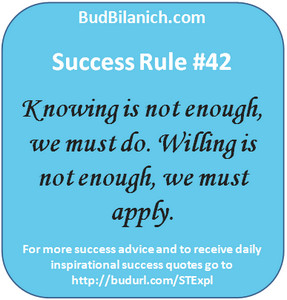 Rule number 4 is about personal responsibility. I want to revisit that idea here. Personal responsibility means using this material once you learn it. I wrote this book to provide you with useful information and knowledge on becoming a success in your career and life. But, as the U.S. Steel pencils my Dad brought home from work used to say, “Knowing’s not enough.”
Rule number 4 is about personal responsibility. I want to revisit that idea here. Personal responsibility means using this material once you learn it. I wrote this book to provide you with useful information and knowledge on becoming a success in your career and life. But, as the U.S. Steel pencils my Dad brought home from work used to say, “Knowing’s not enough.”
I’ve tried to present this material in such a manner that it provides you with some ideas of what to do to become a success in your life and career. It’s up to you to think about what’s here and decide if and how you are going to use it. That’s what personal responsibility is all about.
A Message to Garcia is one of the best-known writings on the idea of personal responsibility. It is an inspirational essay written in 1899 by Elbert Hubbard that has been made into two movies, reprinted as a pamphlet and a book, translated into 37 languages, and was well known in American popular and business culture until the middle of the twentieth century. It was originally published as a filler without a title in the March 1899 issue of Philistine magazine.
A Message to Garcia celebrates the initiative of a soldier who was assigned and accomplished a daunting mission. “He asked no questions, made no objections, requested no help, and accomplished the mission.” The soldier was Andrew Summers Rowan, a class of 1881West Point graduate.
The essay suggests that the reader should apply this attitude to his or her own life as an avenue to success. Its wide popularity at the time was reflective of the general appeal of self-reliance and energetic problem solving in American culture. Its “don’t ask questions, get the job done” message was often used by business leaders as a motivational message to their employees. It was given to every United States Sailor and Marine in both World Wars and was often memorized by schoolchildren.
The essay is about an event in the Spanish-American War in 1898. As the American army prepared to invade the Spanish colony of Cuba, they needed to contact the leader of the Cuban insurgents, Calixto Iniguez Garcia. Garcia had been fighting the Spanish for Cuban independence since 1868 and sought the help of the United Sates.
Here are some selected excerpts from A Message to Garcia:
“In all this Cuban business there is one man who stands out on the horizon of my memory like Mars at perihelion. When war broke out between Spain and the United States, it was very necessary to communicate quickly with the leader of the Insurgents. Garcia was somewhere in the mountain fastnesses of Cuba – no one knew where. No mail or telegraph could reach him. The President must secure his co-operation, and quickly.
What to do!
Someone said to the President, ‘There is a fellow by the name of Rowan who will find Garcia for you, if anybody can.’
Rowan was sent for and given a letter to be delivered to Garcia…
McKinley gave Rowan a letter to be delivered to Garcia; Rowan took the letter and did not ask, ‘Where is he?’
By the Eternal! There is a man whose form should be cast in deathless bronze and the statue placed in every college of the land. It is not book-learning young men need, nor instruction about this or that, but a stiffening of the vertebrae which will cause them to be loyal to a trust, to act promptly, concentrate their energies: do the thing – ‘Carry a message to Garcia…’”
Knowing is not enough. You have to do. We all have to do. Be like Rowan. Treat all of your tasks as “a message to Garcia.” If you would like to have the full text of A Message to Garcia, click here.

Speak Your Mind